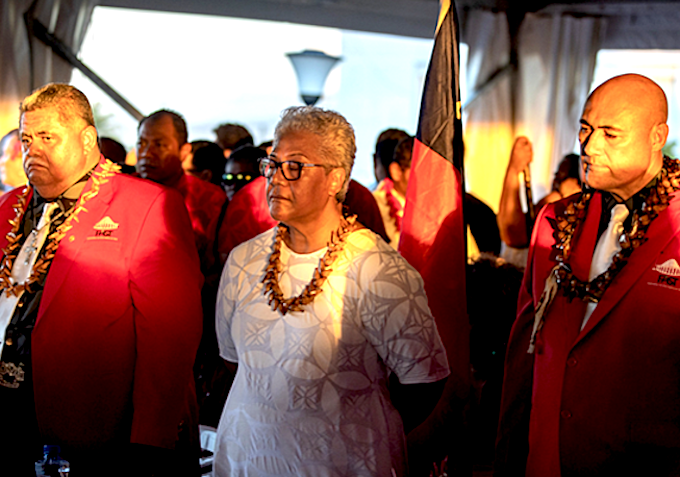
By Lanuola Tusani Tupufia-Ah Tong in Apia
Samoa’s Court of Appeal ruled today that the Faatuatua ile Atua Samoa ua Tasi (FAST) party was the country’s new government bringing three months of political stalemate to a close.
The court, the highest in the country, found that a swearing-in ceremony conducted by the party on the lawns of Parliament on May 24 was in fact legally binding, immediately installing FAST as the nation’s new government and declaring it had been so for nearly two months.
The decision apparently brings to an end the 22-year reign of Tuila’epa Dr Sa’ilele Malielegaoi as the nation’s Prime Minister.
Under the court order he will be succeeded by Samoa’s first female Prime Minister, Fiame Naomi Mata’afa.
In their conclusion, the Court of Appeal said to avoid doubt Samoa has had a lawful government since May 24, namely that led by the FAST party.
The decision also ends nearly four decades of uninterrupted political dominance by the Human Rights Protection Party (HRPP), which first won government in 1982.
Fiame is a former member of Tuila’epa’s government and Deputy Prime Minister who quit the ruling party last September over what she said were plans to dismantle the rule of law in the form of three bills that were passed into law in December.
Widespread criticism
The bills drew widespread criticism for their effect on the independence of the courts from legal experts and the nation’s judges.
Fiame led the newly created FAST party to a slender one-seat victory 26-25 following the holding of April 9 national elections.
The impromptu swearing-in was held on May 24 — the last day on which Parliament was obliged to meet after a national election according to a stipulation in the nation’s constitution.
That ceremony, which was boycotted by HRPP members and the Head of State, was conducted before a majority of FAST Members of Parliament and followed a Supreme Court order the day prior ruling that must Parliament convene.
But the ceremony was held outside the Legislative Assembly building after the former Speaker of the Parliament, Leaupepe Toleafoa Faafis, ordered that it be locked down.
While the swearing-in was previously struck down by the Supreme Court, the FAST party argued that it needed to be held out of the “principle of necessity”, namely to stop the breach of that constitutional requirement.
The Chief Justice, Satiu Simativa Perese, alongside Justice Niava Mata Tuatagaloa and Justice Tafaoimalo Leilani Tuala-Warren delivered the decision at 4.30 pm this afternoon.
Legal challenges
Since then the swearing-in HRPP’s numbers on the floor of of Parliament has fallen by seven to reach 18 following successful seat-by-seat post-election legal challenges to its election victories that will result in fresh byelection contests.
The HRPP and the Head of State have ignored decisions instructing them to convene Parliament that they could not do so until all Members of Parliament were represented in the Legislative Assembly, particularly women MPs who are required to make up 10 percent of all legislators under a constitutional mandate.
The panel of justices said it did not recognise the caretaker government being legitimate and said it was unlawfully occupying office.
The court also ruled that the role of the Head of State in swearing-in the Speaker and members of the FAST are ceremonial roles to administer the swearing-in where the oath is to the Almighty God.
The appeal from the Attorney-General’s Office was dismissed and the cross appeal from the FAST party upheld.
The question of whether the courts have the legal right to force Parliament to sit in cases where the constitution had been violated, or whether that power was exclusively vested in the Head of State, lay at the heart of the case, which was held last week.
In that hearing, arguing on behalf of the Samoa Law Society, New Zealand QC Robert Lithgow said something had stood in the way of the Legislative Assembly convening despite the court’s clear power to force Parliament to sit within a day.
Constitution’s ‘higher purpose’
He said the constitution, as the supreme law of the land, could not be “bolted” down by interested parties but it had a broader, higher purpose: protecting the central interests of the Samoan people as expressed by them in their recent election.
Friday’s decision came as a surprise to parties involved in the case, who had previously been under the impression that a decision would not be handed down until Monday next week.
A notification that a decision on the matter had been reached was only sent to involved parties at about five minutes past 4 pm this afternoon with the decision handed down shortly after at about 4.30 pm.
The HRPP was added as a party to the Supreme Court case but no comment has yet been made by Tuila’epa or any of its other representatives.
In late May, Tuila’epa promised to abide by any ruling by Samoa’s highest court on the issue of the validity of the swearing-in.
Lanuola Tusani Tupufia-Ah Tong is a Samoa Observer journalist. Republished with permission.












































